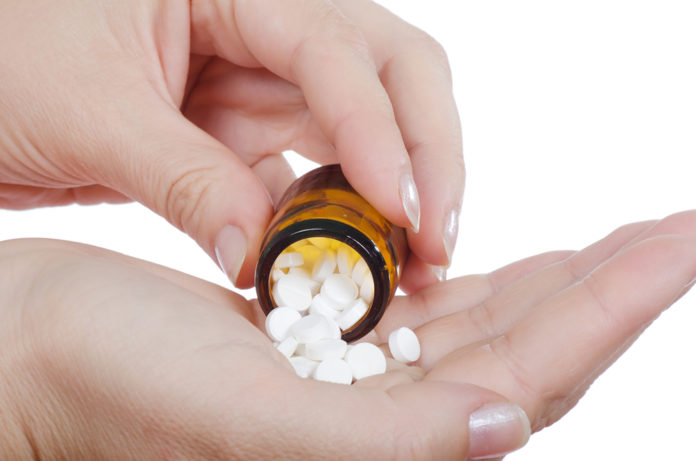Ibuprofen and other common painkilling medications are linked to an increased risk of cardiac arrest– when your heart abruptly stops working, researchers have warned after discovering it increases the risk of cardiac arrest by 31 per cent. A new study from Denmark published on Wednesday (January 15) in the European Heart Journal – Cardiovascular Pharmacotherapy.
Ibuprofen, currently available in supermarkets and corner shops in both generic form and under brand-names Nurofen and Maxigesic, Advil, are all a member of the class of painkilling medications called non-steroidal anti-inflammatory drugs, otherwise known as NSAIDs. But, ibuprofen – the most common NSAID – increased that risk by a staggering 50 per cent.
NSAIDs or non-steroidal anti-inflammatory drugs, are among the most commonly used drugs worldwide. Researchers from the University of Copenhagen found other NSAIDs, such as diclofenac, present an even greater risk of cardiac arrest – when the heart suddenly stops pumping blood around the body. Diclofenac, available over the counter in the UK until 2015 and still taken on prescription, raised the risk by 50%.

Author Professor Gunnar H. Gislason, a cardiology professor at Copenhagen University Hosptial Gentofte, said people should only take the drug when absolutely necessary and should be cautious. And he added these drugs should be used with caution and that patients with cardiovascular disease or other heart problems may want to avoid them.
A 10-year Danish study of more than 28,000 patients in Denmark found the use of ibuprofen – commonly sold as Nurofen or Advil and other non-steroidal anti-inflammatory drugs (NSAIDs) was associated with a 31 per cent increased risk of a cardiac arrest. The findings have led to calls for tighter restrictions on the sale of NSAIDs and to look specifically at the impact of NSAIDs on cardiac-arrest risk. The findings add to those of previous study, which has also found a link between non-steroidal anti-inflammatory drug use and a higher risk of heart problems, including heart failure, heart attack and stroke.
“Allowing these drugs to be purchased without a prescription, and without any advice or restrictions, sends a message to the public that they must be safe,” said author Professor Gunnar H. Gislason, professor of cardiology at Copenhagen University Hospital Gentofte, Denmark. “Previous studies have shown that NSAIDs are related to increased cardiovascular risk which is a concern because they are widely used.”

In the new study, the researchers examined all out-of-hospital cardiac arrest patients (a total of 28 947 patients) in Denmark between 2001 and 2010 using the nationwide Danish Cardiac Arrest Registry. Information was collected on all redeemed prescriptions for non-steroidal anti-inflammatory drugs (NSAIDs) from Danish pharmacies since 1995. Non-steroidal anti-inflammatory drugs (NSAIDs) include the non-selective NSAIDs (diclofenac, naproxen, ibuprofen), and COX-2 selective inhibitors (rofecoxib, celecoxib).
A case-time-control design was used to examine the association between NSAID use and cardiac arrest. Out of the 28,947 patients, more than 3,376 were treated with an NSAID up to 30 days before their cardiac arrest. Ibuprofen and diclofenac were the most commonly used NSAIDs. The use of ibuprofen was linked with a 31% increase in the risk of cardiac arrest, and the use of diclofenac was linked with a 50% increase in the risk of cardiac arrest. Naproxen and COX-2 selective inhibitors (rofecoxib and celecoxib) were not associated with the occurrence of cardiac arrest, but this might have been because these drugs were used less commonly, the researchers said.
The drugs are known to have numerous effects on the cardiovascular system which could explain the link with cardiac arrest. NSAIDs can cause constriction of arteries that control blood flow to the heart, increase fluid retention, blood clots and raise blood pressure.
Professor Gislason said, “I don’t think these drugs should be sold in supermarkets or petrol stations where there is no professional advice on how to use them. Over-the-counter NSAIDs should only be available at pharmacies, in limited quantities, and in low doses.”

According to pervious warning, from the U.S. Food and Drug Administration, higher doses of NSAIDs may increase people’s risk of stroke or heart attack. Patients who use these painkillers should take the lowest dose that works, for the shortest time possible, and people with high blood pressure or cardiac disease should speak with a medical professional before using NSAIDs, the FDA advises.
The researchers calculated whether a patient would have been taking non-steroidal anti-inflammatory drugs or NSAIDs during the case period by using data about the daily dose of the treatment and the number of tablets in the prescription. They recommended that people not take more than 1,200 milligrams of ibuprofen (or six 200-mg tablets) in one day.
Dr. Gunnar Gislason warned, “do not take more than 1200 mg of ibuprofen per day.” “Naproxen is probably the safest NSAID and we can take up to 500 mg a day. Diclofenac is the riskiest NSAID and should be avoided by patients with cardiovascular disease and the general population. Safer drugs are available that have similar painkilling effects so there is no reason to use diclofenac,” he added.


























